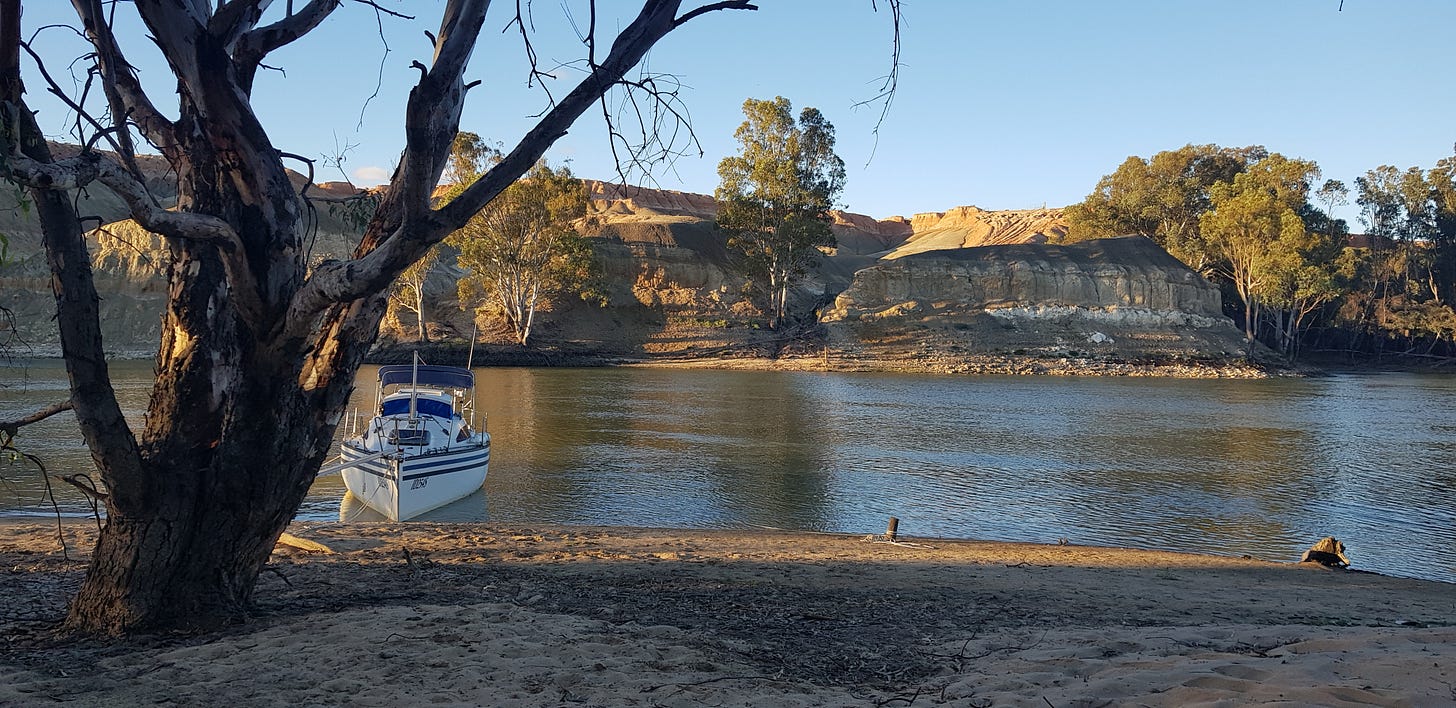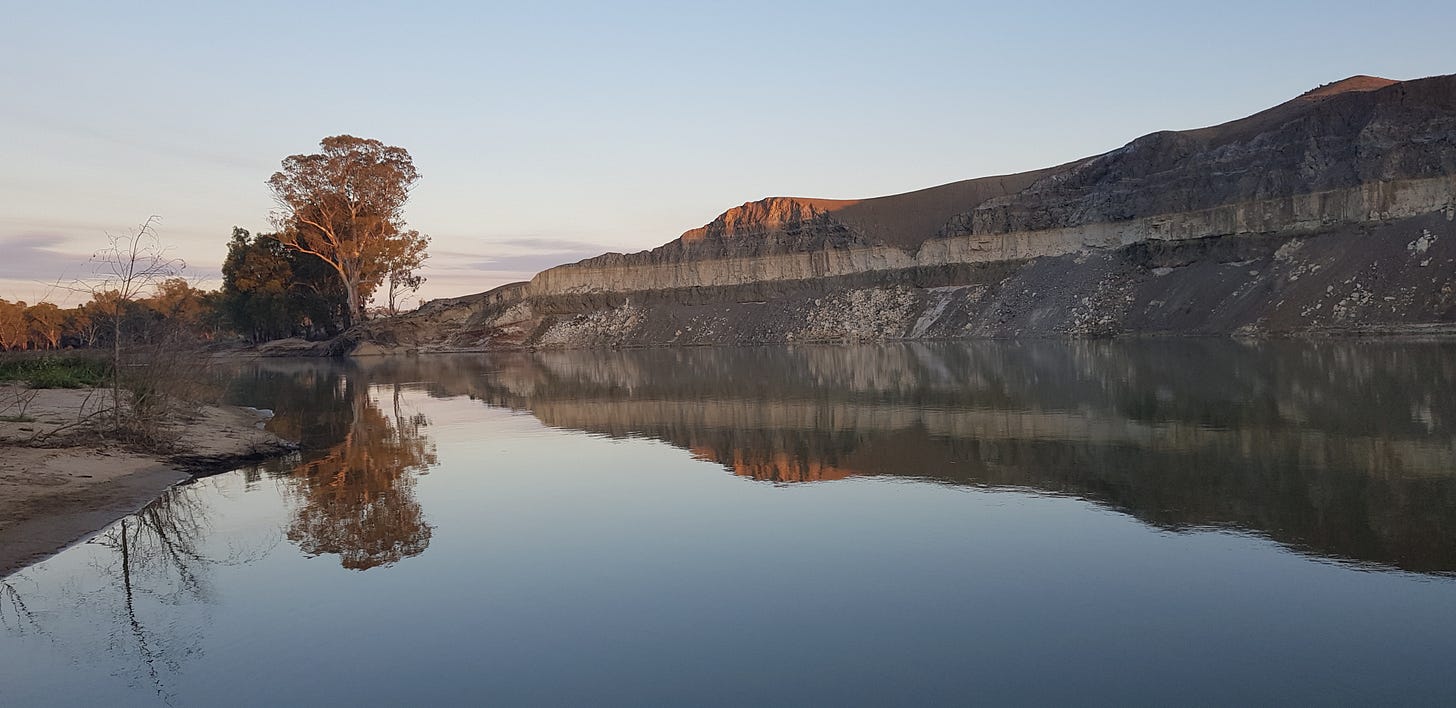If you plan to "follow your bliss" in older age, start learning the skills you'll need
Unexpected challenges on a boating escapade with seniors
“Throw the bow line on shore now.”
“Then jump.”
“Then tie it to a tree so it can’t slip.”
That’s my skipper shouting at me as our boat careens toward the high river bank.
I’m expected to follow all three instructions with grace. Any good crew would.
But this is my maiden river trip.
And my first time as THE CREW.
I am fast realizing that I may have missed a couple of essential classes somewhere.
Or at least not practiced enough to feel on top of it.
So this trip will be a sink-or-swim (literally) effort.
I am learning a lot on-the-job.
Not ideal.
You know, it’s all well and good to say you want more adventure in your later years.
But I’m finding it would have been good to prepare well beforehand if I plan to be useful, invited back, and enjoy this trip.
I’m a senior. And so is everyone on this trip, one is in his mid 80s.
So, what are most seniors up to in their third act?
According to the new AI oracle, ChatGPT, most people over 65 spend time learning:
Languages
Technology and digital skills
Hobbies and drafts
Fitness and wellness
Volunteer work
Cooking and baking
Gardening and nature
Music and art
Continuing education
A few more unusual ones (that I’ll postpone for now), include:
Drone flying
Code breaking
Circus arts
Astrophotography
Metalwork
So how hard could boating be?
I’d signed up to crew on my sister’s sailing boat. This time, we’re without a mast, cruising on one of Australia’s main rivers, the mighty Murray.
I expected to spend time in the galley getting lunch ready.
Maybe push the boat off a sturdy wharf one day.
Even hunt for firewood when we’d found a cosy camp area.
But I got way more than I bargained for.
You see, I am usually the crew’s crew.
Not the crew.
Now, I am needed and relied on. Because she has a lot on her mind.
And it matters whether I can grasp stuff quickly.
Pronto.
Right now.
Be careful!
These skills are not academic.
Mastering them protects (or risks) others’ lives.
Or saves my own life.
They matter.
Traveling with us in their own boats are 5 couples, all veteran sailors.
All used to
boating
shallow water
jumping fast
gauging distances and depths
starting and stopping engines
making repairs
making do.
They all know each other.
They know to ask for help when needed.
They know the names of every part of the boat.
They know that timing is important in a moving boat.
They know that tide, current, and wind affect our speed and stability.
They’re used to cruising on lakes and rivers.
The one thing we don‘t have much experience with is locks.
Murray River locks were built 100 years ago to allow for trade and irrigation up and down the river.
And yes, a lock is where the river level drops three metres while you’re on your boat.
And you hold ropes and strain to prevent your boat from smashing into your friend’s boat a metre away. Or touching the green, slimy concrete wall beside your foot.
While a lockmaster is telling you that the water is less than a metre deep ahead, so better beware. And you can see ahead the tree root snags rising on both sides of the river as well.
So you’re poised, ready to raise the keel, raise the tiller, or cut the engine if the boss says so.
In that shallow water, the rudder may be too low, so you learn to steer with the engine.
You learn to read a river map with its symbols of
markers to avoid
red and green markers to stay left or right of
snags near the bank (enormous eucalypt root systems, mostly hidden)
sandy beaches
shallow water
old paddle steamer wrecks
bridges
wetlands
pumps.
You do this while you get entranced by your own markers.
There are pelican flocks, little eagles, whistling kites, egrets, and eagles soaring above. With nests perched impossibly in the dead trees of wetlands.
Thousands of corellas taking flight and resettling in a tree.
And emu flocks and kangaroos, curious on the banks.
When it dawns on me I need to know this, I practice making a bowline (the king of the knots) because it can be tied to a mooring and untied easily.
And a clove hitch, because it’s the easiest way to attach a fender to avoid banging into another boat.
But I just cannot walk the plank (yes, literally) between the boat and a high bank. The 1.5-meter drop stumps me.
And I fail miserably when first asked what I’d do if the skipper fell overboard. (No doubt that shattered her confidence for a minute.)
But I’m not too bad about navigating back using the sun as a compass in a tangled dense bushland one morning.
Or writing up the log each day.
Or holding back on mutiny.
So, how does boating rank on the list of senior skills to covet? More challenging than baking or gardening, but not quite up there with codebreaking or drone flying.
But I'd have to say it did feel a lot like learning circus arts sometimes. Picture limbs in strange positions, while I figured out how to get on and off the boat and stay dry.
And the payoff?
New friends.
Travel possibilities.
Campfire laughs.
Tall boating stories.
Silent nights.
Moonlight mornings.
Golden cliffs.
Moonscapes.
Fish jumping, landing with a splash.
A mass of Milky Way stars.
Hearing a pied butcherbird sing pre-dawn.
Getting to know a wide, long river. Its moods, its power, and its beauty. How it sustains life.
Knowing that I can do this. For decades. As a senior.
And that I need to get cracking on my lessons so I can stay the course, long-term.
.







